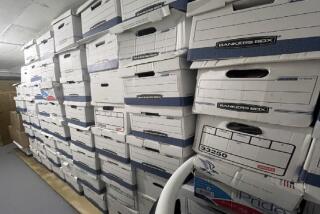Criminal Fraud Case Against Defense Contractor Is Dismissed
- Share via
In a major blow to the government, a federal judge dismissed a criminal fraud case against a Southern California defense contractor Friday on the grounds that investigators improperly read privileged attorney-client documents during a search at the company’s offices.
U.S. District Judge Robert M. Takasugi announced in July that he intended to throw out the charges lodged against Solid State Devices Inc. of La Mirada and five other defendants.
But he stayed his ruling until Friday to give prosecutors time to salvage their case with a proposal that called for starting the investigation from scratch with a new team of prosecutors and investigators.
Takasugi rejected that last-ditch bid in a five-page written opinion, saying that he had no confidence in the government’s ability to keep the tainted information from falling into the hands of a newly assembled prosecution team.
“Such reliance by the court would be irresponsible,” Takasugi said.
The judge based his ruling on the 6th Amendment of the Constitution, which guarantees an accused the right to effective defense counsel.
He dismissed the charges with prejudice, meaning they cannot be refiled.
Lawyers for the defendants expressed pleasure with the outcome.
“This is a judge who cares about the Constitution and was willing to go below the surface and respond appropriately to what was a clear case of government misconduct,” said defense lawyer Robert L. Corbin.
“We’re disappointed,” said Chief Assistant U.S. Atty. Richard E. Drooyan, second in command at the Los Angeles federal prosecutors office. He said he and his staff are considering whether to appeal the dismissal.
Solid State Devices of La Mirada, a related company, Unisem International of Santa Fe Springs, and four mid-level managers were indicted on charges of selling substandard semiconductors for use in the F-18 fighter jet, the Atlas and Titan missiles, the space shuttle and the unfinished International Space Station.
In January, 35 Defense Department investigators raided Solid State Devices’ headquarters, looking for evidence of other crimes. When they arrived, they found offices and file cabinets with signs reading, “privileged attorney-client materials.”
Despite protests from company officials and their lawyers, members of the search team read documents in those files, including an outline of defense strategy in the case.
During an evidentiary hearing called by Takasugi to examine government conduct in the search, the prosecutor in charge of the case, Assistant U.S. Atty. Jeffrey C. Eglash, said he instructed the agents to scan the disputed documents to see if they contained information within the search warrant’s scope. If they found that a document did not contain information covered by the warrant, they were supposed to stop reading it immediately.
However, defense lawyers presented a memo from one member of the search party indicating that he had been told by his superior to thoroughly read any attorney-client materials he found.
In his ruling, Takasugi expressed surprise that the government did not follow traditional practice to “seize, seal and do not review” any attorney-client documents found during the search. Those documents could then have been turned over to a judge or a special master appointed by the court to determine which, if any, were privileged.
More to Read
Inside the business of entertainment
The Wide Shot brings you news, analysis and insights on everything from streaming wars to production — and what it all means for the future.
You may occasionally receive promotional content from the Los Angeles Times.










